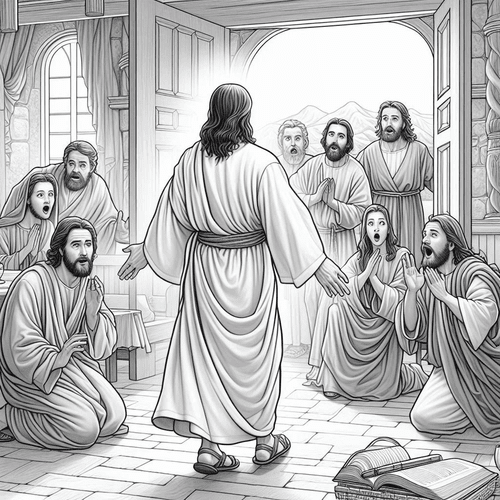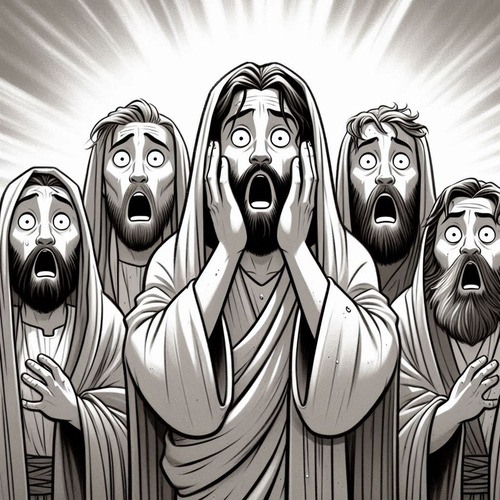What Were Jesus’ Final Words on the Cross?
RECONCILING APPARENT CONTRADICTIONS IN THE GOSPEL ACCOUNTS
The question of Jesus’ final words on the cross continues to puzzle many. Did He cry out “My God, my God, why have you forsaken me?” as Matthew and Mark record? Or did He peacefully declare “Father, into your hands I commit my spirit” as Luke tells us? Or, perhaps it was John’s account of “It is finished” that captured His true final moment?
But here’s the crucial point that resolves the apparent contradiction: none of the Gospel writers actually claim these were Jesus’ absolute final words before death. They simply record significant statements Jesus from the cross. When there’s no claim of finality, where exactly is the contradiction?
The answer becomes even clearer when we recognise Christ spoke multiple times during His six-hour ordeal on the cross, and each evangelist selected different words to emphasise crucial theological truths about our salvation.
THE SCRIPTURAL EVIDENCE
- Matthew 27:46 and Mark 15:34 record Jesus crying out at the ninth hour: “My God, my God, why have you forsaken me?” This Aramaic cry (Eli, Eli, lema sabachthani) echoes Psalm 22:1, revealing the weight of bearing humanity’s sin and experiencing separation from the Father.
- Luke 23:46 presents Jesus’ final breath with the words: “Father, into your hands I commit my spirit.” This declaration of trust demonstrates Christ maintained perfect faith in His Father’s plan even in death.
- John 19:30 records Jesus saying “It is finished” (Tetelestai) after receiving sour wine—a Greek term meaning “paid in full,” often used to mark completed transactions or fulfilled obligations.
JESUS’ FINAL WORDS ON THE CROSS: HARMONY, NOT CONTRADICTION
The alleged contradiction dissolves when we examine what the Gospel writers actually claim. None of them state they are recording Jesus’ absolute final words. They record significant statements made during the crucifixion, but they don’t claim chronological finality.
Consider the language:
- Matthew and Mark record Jesus crying out but don’t claim this was His last utterance
- Luke presents Jesus’ prayer to the Father without asserting it was His final breath
- John records “It is finished” but doesn’t claim nothing else was said afterward
Each Gospel writer, inspired by the Holy Spirit, selected different sayings to highlight specific aspects of the atonement. The chronological sequence likely unfolded with Jesus speaking multiple times during His final moments: the cry of dereliction, the declaration of completion, and the commitment of His spirit to the Father.
T4HREE CRUCIAL THEOLOGICAL TRUTHS
First, the reality of penal substitution: Christ’s cry of abandonment wasn’t theatrical—it was the genuine experience of bearing God’s wrath against sin. For the first time in eternity, the Son experienced separation from the Father so we might never face that judgment ourselves.
Second, the completion of redemptive work: “It is finished” (Tetelestai) wasn’t a sigh of relief but a declaration of victory. The same word appeared on ancient receipts meaning “paid in full.” Christ’s sacrifice left nothing undone, no debt unpaid, no requirement unmet for those who trust in him.
Third, the restoration of fellowship. By the time Jesus committed His spirit to the Father, the work was complete and fellowship was restored. The curtain had been torn, the way opened, and Christ could again address God as “Father” rather than “My God.”
WHY THIS MATTERS FOR US
Understanding Jesus’ final words provides profound comfort and assurance. When we face seasons of feeling abandoned or forsaken, we remember Christ experienced ultimate abandonment so we never will. When we wonder if our salvation is secure, we hear His declaration that the work is finished—not dependent on our efforts but completed by His sacrifice.
When we fear death itself, we see Jesus modelling perfect trust, committing His spirit to the Father with confidence in the resurrection to come.
JESUS’ FINAL WORDS ON THE CROSS: THE BEAUTY OF BIBLICAL HARMONY
These different Gospel accounts don’t create contradictions—they reveal the precision of Scripture. None of the four evangelists claim they were recording Jesus’ final words on the cross. Rather, they were mentioning Jesus’ significant statements during his ordeal on the cross. They selected different sayings to emphasise different theological truths.
The real question isn’t “Which Gospel got it right?” but “What did each Gospel writer want us to understand about the cross?” Matthew and Mark emphasised the reality of God’s wrath. Luke highlighted the restoration of fellowship. John proclaimed the completion of Jesus’ redemptive work.
When we realise Jesus’ crucifixion involved multiple statements over several hours, and that no Gospel writer claimed to record His absolute final utterance, the alleged contradiction simply evaporates. What remains is the beautiful harmony of Scripture, with each account contributing essential truths about our salvation.
Rather than choosing between the Gospel accounts, we embrace them all, marvelling at how God’s Spirit guided each writer to emphasise precisely what the church would need to understand the fullness of our redemption. In Christ’s multiple final words, we find not confusion but clarity—not contradiction but the beautiful harmony of Scripture revealing the multifaceted glory of our salvation.
The cross reveals both the depth of God’s wrath against sin and the heights of his love for sinners. In Jesus’ final words, we hear both the cost of our redemption and the certainty of our peace with God.
JESUS’ FINAL WORDS ON THE CROSS: RELATED FAQs
What are the traditional “Seven Last Words” of Jesus? Reformed scholars like Charles Spurgeon and Martyn Lloyd-Jones have preached extensively on the traditional seven sayings: “Father, forgive them” (Luke 23:34), “Today you will be with me in paradise” (Luke 23:43), “Woman, behold your son” (John 19:26-27), “My God, my God, why have you forsaken me?” (Matthew 27:46), “I thirst” (John 19:28), “It is finished” (John 19:30), and “Father, into your hands I commit my spirit” (Luke 23:46). This tradition helps us understand the fullness of Christ’s suffering and victory.
- Why did Jesus quote Psalm 22:1 when He cried out “My God, my God”? Reformed theologian John Calvin argued that Jesus wasn’t merely expressing despair but was pointing to the entirety of Psalm 22, which begins with abandonment but ends with vindication and praise. Contemporary Reformed scholar RC Sproul emphasised Christ experienced real God-forsakenness as our substitute, bearing the full weight of divine wrath that we deserved. This wasn’t acting or symbolism—it was the actual experience of being cut off from the Father’s fellowship.
- What does “It is finished” (Tetelestai) mean in the original Greek? The Greek word “tetelestai” was commonly used in ancient commercial transactions to mean “paid in full” and appears on archaeological receipts from Jesus’ time. Reformed scholars like Leon Morris have noted it’s in the perfect tense, indicating a completed action with ongoing results. This wasn’t just Jesus saying His ordeal was over, but declaring the entire work of redemption was accomplished—nothing more was needed to be done for salvation.
Did Jesus actually die of crucifixion or from a broken heart? While crucifixion typically caused death by asphyxiation, some Reformed theologians like John MacArthur have suggested Jesus may have died from cardiac rupture due to the extreme stress of bearing sin. The medical evidence (blood and water flowing from his pierced side in John 19:34) could support this view. However, most Reformed scholars emphasize that regardless of the medical mechanism, Jesus voluntarily laid down his life at the precise moment his atoning work was complete.
- How do Reformed theologians view the “cry of dereliction” compared to other traditions? Unlike some traditions that view Jesus’ cry as merely expressing His humanity, Reformed theology insists it represents actual divine abandonment—the Son experiencing hell itself as our substitute. Westminster Seminary’s Sinclair Ferguson argues this wasn’t a break in the Trinity but rather the Son experiencing the full weight of sin-bearing while maintaining His divine nature. This distinguishes Reformed theology from both liberal interpretations (mere human anguish) and some conservative views that deny real God-forsakenness.
- Why don’t all four Gospels record the same final words? Reformed hermeneutics, as taught by scholars like Geerhardus Vos, emphasises each Gospel writer had specific theological purposes under divine inspiration. Matthew and Mark, writing primarily to Jewish audiences, highlighted the fulfillment of Old Testament prophecy in Jesus’ cry from Psalm 22. Luke, the physician, focused on Jesus’ peaceful surrender of his spirit. John, the beloved disciple, emphasised the completion of redemptive work with “It is finished.”
What’s the significance of Jesus calling out “Father” in Luke but “My God” in Matthew/Mark? Reformed theologian Herman Bavinck noted this distinction reflects the different aspects of Christ’s experience on the cross. The “My God” cry represents Christ as our sin-bearer, experiencing the judicial wrath of God and temporary separation from intimate fellowship. The “Father” address shows the restoration of that fellowship once the work was complete. This demonstrates both the reality of penal substitution and the ultimate victory of the atonement in Reformed theology.
JESUS’ FINAL WORDS ON THE CROSS: OUR RELATED POSTS
- Last Words on the Cross: Into Your Hands I Commit My Spirit
- “It is Finished”: What Does Jesus Mean?
- John 19:28: Why Did Jesus Say ‘I Thirst’?
- ‘Behold Your Mother’: Why Does Jesus Entrust Mary to John?
- Father, Forgive Them: Who Was Jesus Praying For?
- Why Does Jesus Cry, ‘My God My God’?
Editor's Pick

Will We Remember This Life in Heaven? What Isaiah 65:17 Means
"Will I remember my spouse in heaven? My children? Will the joy we shared on earth matter in eternity?" These [...]

From Empty to Overflow: The Abundant Life Jesus Promised
(AND WHY YOU SHOULDN’T SETTLE FOR LESS) We're surviving, but are we thriving? If we're honest, there's a gap between [...]

What Does Jesus Save Us From?
THREE BIBLE TRUTHS ABOUT SALVATION "Jesus saves." We’ve seen it on bumper stickers, heard it shouted at sporting events, maybe [...]

If God Wants Everyone Saved, Why Aren’t They?
THE REFORMED VIEW ON GOD’S DESIRE VS HIS DECREE The question haunts every believer who has lost an unbelieving loved [...]

The One Man Mystery in Acts 17:26: Is It Adam Or Noah?
When the Apostle Paul stood before the philosophers at Mars Hill, he delivered an insightful statement about human unity: “And [...]

Megiddo Or Jerusalem: Where Did King Josiah Die?
Recent archaeological discoveries at Tel Megiddo continue to reveal evidence of Egyptian military presence during the late 7th century BC, [...]

Losing Your Life Vs Wasting It: How Are the Two Different?
AND WHY DID JESUS PRAISE THE FORMER? Jesus spoke one of the most perplexing statements in Scripture: “For whoever wants [...]

Can Christians Be Demon Possessed? What the Bible Teaches
Perhaps you’ve witnessed disturbing behavior in a professing Christian, or you’ve struggled with persistent sin and wondered if something darker [...]

Sacred Fury: What Christ’s Temple Cleansing Truly Means
Mark 11 records the crack of a handmade whip that echoed through the temple corridors. Tables crashed to the ground, [...]

Did Jesus Cleanse the Temple Twice?
OR DID JOHN DISAGREE WITH THE SYNOPTICS ON TIMING? One of sceptics’ favourite "gotcha" questions targets what they see as [...]
SUPPORT US:
Feel the Holy Spirit's gentle nudge to partner with us?
Donate Online:
Account Name: TRUTHS TO DIE FOR FOUNDATION
Account Number: 10243565459
Bank IFSC: IDFB0043391
Bank Name: IDFC FIRST BANK






